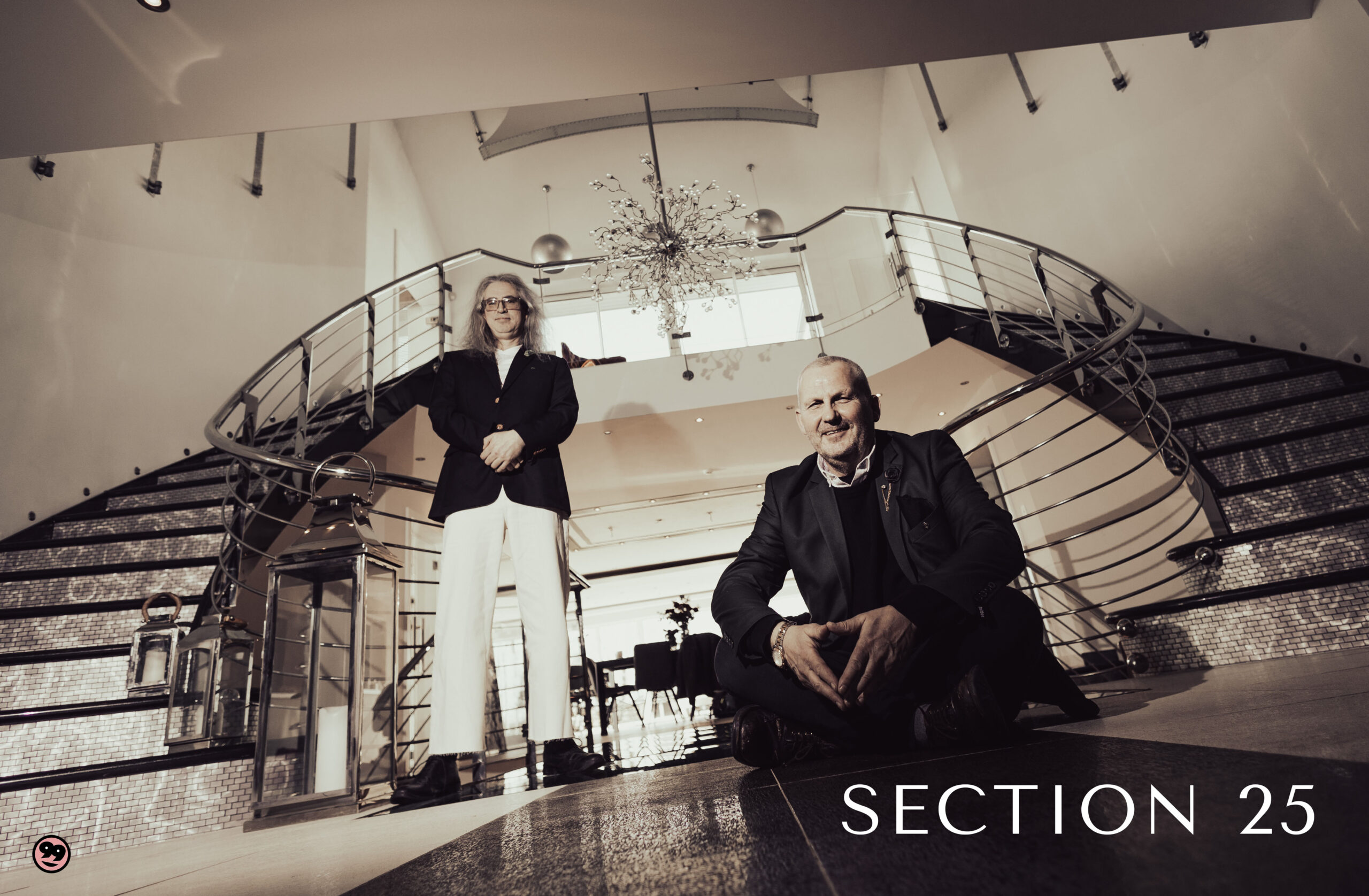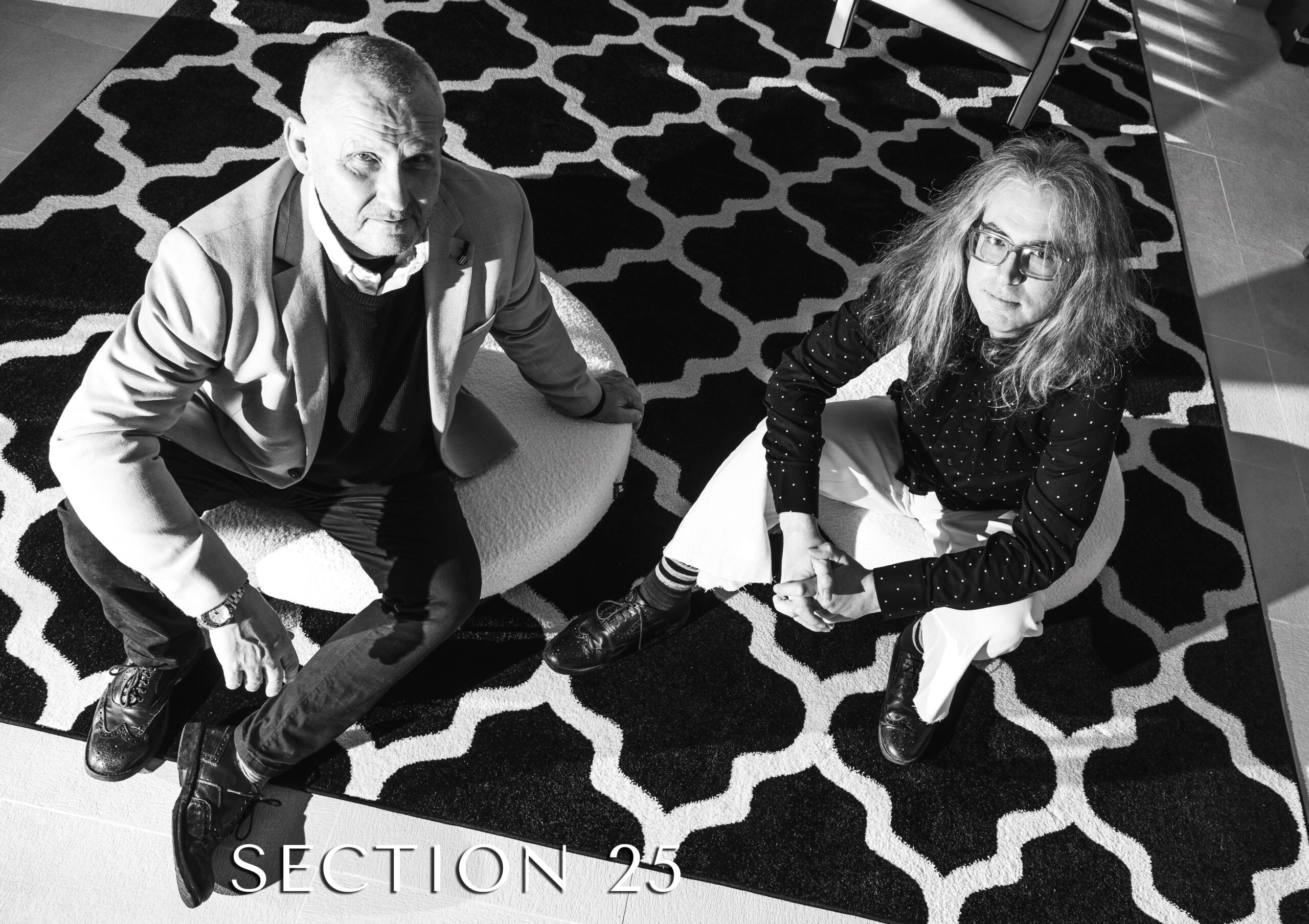VIN CASSIDY: SECTION 25 – 2025

Their first studio album of new material since 2018, Section 25 release ‘Move On’ and are performing live again, now as a duo following many line-up changes since the passing of co-founding member Larry Cassidy. His brother, Vin Cassidy, continues the band’s legacy as a stripped down electro-funk, industrial, percussionist outfit. After their first London show in two years, Vin talked to me about the themes behind the new tracks, his musical partnership with Steve Stringer, playing with Joy Division and bringing jamming back to the band’s live performances.
You’ve recently released your new album, ‘Move On’. Your last album was about six years ago. How long has it taken you to write this one and record it over those six years?
We seriously got down to it over the last 12 months: selecting what we wanted to work on, doing the pre-production and recording and then mixing took about 12 months prior to that. We’ve been doing some gigs up to 2019 and then Covid came and there was no live work. A lot of people during Covid wrote books, plays, albums. We were the opposite – we did absolutely fuck all. And so it was only in the last year we’ve got down to working on that album.
Is there something more significant in the title of the album, ‘Move On’? I just wondered if there’s anything there because I know that’s something that generally as a band you’re wanting to do.
It’s more about moving on a personal level, for me. With regard to just going through life and the stuff that happens and the stuff that you collect, like the baggage and expressions.
But I was thinking also about the sound of the album…I’ve heard some of the last albums you’ve done, I’d say this has got more of an electro-funk sound, even a bit of an industrial sound. Maybe also you’re moving forward in terms of the sound and the lyrics as well; it just seems like it’s a lot different to what you’ve done recently.
Personnel changes in the band…no matter how you deal with that or try to sort that out, it always does fall out on a personal level and it can be upsetting. So there was moving on from that kind of stuff. And also doing the vocals was a big deal for me…I’ve been playing in bands and this band for a long, long time, but not singing; maybe a bit of backing vocals now and again. So it was quite a big deal for me to write the lyrics and sing them – that was quite a big leap forward for me on a personal level.
Lyrically what was inspiring you on some of these tracks? I know ‘Back in the Day’ is autobiographical. There were things that were leaping out to me, like for instance, ‘We Are On Our Own’. I don’t know if that was a bit political maybe?
Yeah, I suppose that touches on how you can feel alienated and when you’re low, you can feel that you’re on you own and a little bit vulnerable; it’s coming from that place, really.
We used to jam with Joy Division and do a gig. We’d be supporting them and then the last couple of numbers, we’d come on and all jam together. You don’t fucking get that now. You’re not gonna go and see a main headline band and then the support band come on and jam with them…just playing whatever comes out of your heads for five minutes. We were quite close musically.
Is it more personal then rather than political?
Yeah, I’d say so. I’m not really into politics in terms of party politics: I’m more into politics between people, on a personal level. I know what my political leanings are. It’s not something that I would write about because I think it’s pretty boring, that shit.
And also you re-recorded ‘Human Puppets’. What was the reason you chose that track from the first album?
Well, when that was recorded originally, it was recorded with Martin Hannett with a whole bunch of songs and that was one that was never used. It was never produced, it just stayed in the can – it was something that was never fully realised. So I thought it was time to do that. My brother [Larry Cassidy] wrote the lyrics for that song, and he wrote lyrics for other songs that are on ‘Move On’. But I’ve weaved my own lyrics in with it to maybe fill them out or to make it go more where I want it to go. I thought ‘Human Puppets’ just spoke to me about how things are at the moment; maybe I’m one man, but I I feel like a lot of people feel quite powerless about what’s happening around them right now and controlled by other agencies and it makes me angry.
Is this pessimistic in a way? It definitely felt like some of the way you’re singing as well was a bit of pessimism; kind of monotonous.
I think really that in the end, the message of the song is to cut the strings, which is about releasing yourself from what you can’t change. There’s so much you can’t change what’s happening, the shit that’s being put on you and what’s going on, but you can change internally how you deal with that, what you’re going to do with it and deal with things in a more positive way, from your point of view – do what you need to do in any given situation and ‘move on’.
And can you talk about what’s going on now with you going back to a duo? Could you describe your partnership with Steve [Stringer]?

We’ve worked together since about 2008; a long time. Just worked as a musical partnership, really – I found him. Don’t get me wrong, he can be frustrating and annoying, but on the level of other musicians I’ve worked with, he’s quite loyal and open minded about things. So I think that maintained our relationship. The band, as it was with the five-piece, disintegrated for a variety of reasons. It’s quite difficult to go into it in too much detail, because a couple of people are family. With other people, you may fall out after a band or there’s a split, or people leave you…you don’t have the same difficulties but [with family] you’re bloody related to them.
But it wasn’t for me working out, and I wanted to do things in a different direction/route. Originally, my plan I was going to be not that ruthless. It was going to be the five-piece band to continue as it was, but Steve and I were going to do this side project. But in reality, that’s not what happened: the five-piece band fell apart. People went their own way and Steve and I carried on doing what we’re doing. And it’s been quite an opportunity to make some big changes.
So how many lineup changes have there been since?
In 2019, Steve and I started doing the two-piece thing, and then at the end of 2019 everything was off because of Covid. But prior to that, there’s been loads of incarnations of the band, Christ. We were originally a three-piece back in the day and then it morphed into a five-piece, much more electronic, and then the band went into cold storage for years. Then when we started again, it was my brother singing, then he sadly died in 2010 and his daughter, who had been doing a bit of vocals with us, took over doing the main vocals.
And that carried on from 2010 to about 2018 but it played out for me…it was no disrespect to anybody, but it just run its course. And I wanted to change things around and do things differently. So hence I’m here with this album – I’m really proud of it.
Have any of the past members been involved in this album in any way?
Actually, the original guitarist who left in about, Christ, 1980, Paul Wiggin, is a lovely guy, and he did some guitar on a couple of the tracks on this album. He came down and he did some guitar on ‘We Are On Our Own’ and ‘Human Puppets’. He did guitar on that because he did stuff on the last album as well.
I hadn’t seen Paul for years and years, but Kanye West sampled one of our tracks – like massively, heavily sampled. It wasn’t even really sampled: he used it as a backing track. I was expecting maybe a bit of a big nick, a bit of snare or what you think of a sample, or a bit of a guitar riff or something. But it was like loads of the track. Couldn’t believe it! Anyway, I contacted Paul saying ‘you’re not going to believe what’s happened here’ and we’ve stayed in touch ever since. I’ve asked him [to play live] but he suffers from extreme stage fright and he won’t do it! He does play and puts stuff online and does bits and pieces of his own stuff, but he won’t do gigs.
I guess what I noticed about S25 is that you emulate sounds from other bands you’ve worked with, especially musicians who produced you. Was that something you were aware of at the time, that they were having that effect on you? Did that maybe stifle your ability to find your own sound? Because I read what reviewers were saying back in the day…the main criticism was you sound a lot like Joy Division.
Yeah, yeah. On the one hand, yeah, obviously we were quite close all together, and as musicians, working and doing stuff at Factory [Records]. We used to jam with Joy Division and do a gig. We’d be supporting them and then the last couple of numbers, we’d come on and all jam together. You don’t fucking get that now. You’re not gonna go and see a main headline band and then the support band come on and jam with them. Not just jamming, not doing a song, just playing whatever comes out of your heads for five minutes. So we were quite close musically. And so obviously things tend to cross-filter and that with each other.
But the other thing I’d say, the music press back then in the early ’80s, specifically the NME, fucking hated us. Joy Division as a band cast quite a long shadow. I defy anybody to be on the same label and come in being junior partners and not get compared because the thing as well was that everything had to be produced by Martin Hannett, who had a very specific sound and style which was great, but it may tend to make more comparative. We got compared to PiL, we got compared to Pink Floyd…I just think a lot of it’s lazy journalism; you can’t fucking think of something original? So this is why ‘it sounds a bit like that or it sounds a bit like the other.’
Did you feel that you had a defined sound that was associated with S25?
I mean, it’s hard to be objective about it when you’re doing it. You pick up things and, yeah, you hear stuff that you really like and maybe you want to emulate that or use a bit of this or that without wholesale ripping people off.
I quite like the industrial genre…that’s probably what I’d like to hear more of, actually.

Yeah, yeah. I mean, that’s the kind of thing that I like as well. The process that we operate with is we go into a rehearsal room just playing and recording everything and listen back to it and stuff that sounds like it’ll work… ‘that’s worth keeping…keep that and maybe build on that.’
And you can hear influence as well, like Krautrock with Harmonia and CAN. I can hear that in there and Tangerine Dream.
CAN were one of my favourite bands and Steve’s mad on Krautrock. But who wouldn’t be, it’s fucking brilliant?! Big influences on me when I was a kid.
I was interested in your influences when you were forming the band, and also where you were from – Blackpool where there wasn’t a lot happening.
Well, yeah, I love Krautrock, but loads of different stuff. We used to travel out of town to see bands because there wasn’t a lot happening in Blackpool. We’d go to Manchester, maybe go to Liverpool; we went to see the punk bands because that was what was happening then. And then you’d be inspired to maybe start doing something yourself, because one of the things with punk was it said to people, ‘you don’t have to do, be this, that or the other – just do it.’ That was quite liberating, I don’t know what people think about it now, but it was for me because before then you saw musicians/successful bands – they were semi-godlike figures. You were only there to worship them and buy their records. So get crap, cheap instruments and just start doing it yourself. It was great and then inevitably, if you’re playing a lot, you will start to become a bit better at your instrument and things will start to develop.
Did you all have similar interests as Joy Division and the others at that time in the Manchester scene?
It’s the same kind of stuff – pretty powerful stuff. I remember the first time I saw Joy Division…it was a quite profound experience seeing them live.
When they were on, they were good; pretty powerful. But so was Section 25 when we were the sort of band that was very difficult to predict. When things were working, it was pretty powerful. I think that’s what they liked about us, I guess.
Anyone else that was influential on you growing up?
I used to love Hawkwind; I’m talking about the first few albums…pretty transcendental. Loads of different things. But I loved my drummers; the percussion side of things.
You mentioned about jamming. Is that something that you’d like to see maybe brought back to your live performances?
That’s something that you go out and you start: you’re going to do a song, and nobody has any idea what’s going to happen. You just start playing. I mean, eventually you do. It’s a bit like jazz: you develop certain themes that you can weave in and out of. But yeah, it’d be lovely to do. We haven’t done so much jamming at live concerts for quite a while, really, but it’s a good point.
Krautrock as well, because that’s where it’s organic and experimental and there’s not a start and a finish as such. It’s just you lost in the music.
Yeah, great. It builds in certain ways and becomes quite hypnotic in other ways. It’s quite a different experience, isn’t it? Not enough of that about really.
And also I love that you’re doing the new album tracks as well.
Sometimes you might do one, maybe two tracks. We did six tracks on [the album] tonight and we’ve never done that before, but I thought, fuck it! But they’ve always got this thing where people were expecting you’ve got to do this or tick these boxes or else get pissed off. But it’s really nice doing the new stuff tonight. We might just do more [in the future] and maybe a jammer track as well.
Section 25’s new studio album, ‘Move On’, is out now.
Photos © Vin Cassidy.
© Ayisha Khan.